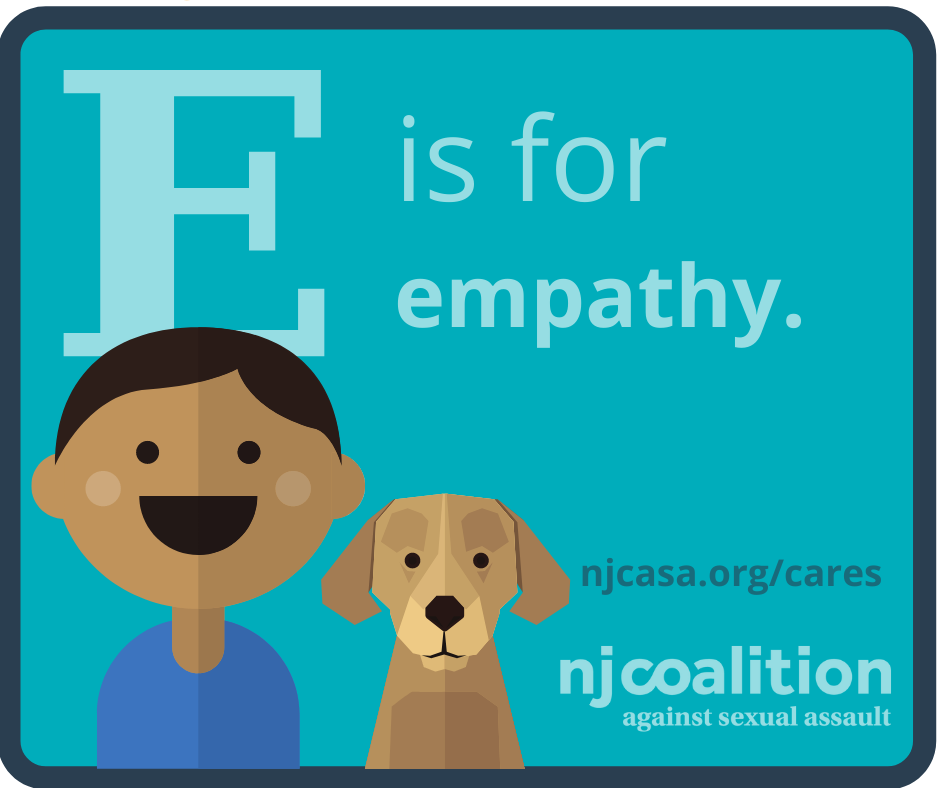During this time of social distancing, the internet continues to play an important role in how we communicate with one another.
For those with access to the internet, many have found ways to continue connecting with their community virtually. But with a screen between us and others, it can be easy to distance ourselves from issues that have little to no impact on our day-to-day lives. This disconnect can place people with different experiences from our own in the “other” category. From comments that come across as “out-of-touch” to inflicting physical harm, a lack of empathy for people with marginalized identities makes it easier for harm to be done to them.

Empathy means understanding and being able to relate to another person’s feelings and life experiences. Extending and practicing empathy is an important protective factor against sexual violence. When we practice empathy, we try to see things from another person’s point of view and imagine how they are feeling. Empathy can be used to promote positive social change. Being mindful of our words and actions online is a step to breaking down social norms that allow interpersonal violence in all its forms to continue.
Here is how you can practice empathy online and make online spaces safer and more inclusive:
Use the internet to get out of your comfort zone. Sometimes when we don’t share experiences with others, it can be difficult to relate. Part of empathy is acknowledging that we can’t fully understand the experience of living a life different than our own, but we can still work to relate to others. It’s impossible to understand what another person is going through entirely — we are all shaped by a unique combination of experiences that are influenced by our race, social class, ethnicity, sexual orientation, gender, religion, and many other factors.
But the internet is full of information! You can use it as a tool to build empathy for people from different communities. This is more important than ever right now, as people who are white/white-passing and non-white people of color are asked to build a better understanding of the unique experience of being a person who is Black in America. Watch videos, read stories and articles, play games, and use live video or live chat with people from different walks of life.
Become a part of a movement and look for commonalities. Social media has helped promote and create social change with hashtags like #MeToo, #BlackLivesMatter, and #BelieveSurvivors. These hashtags have brought to light the lived realities of folks who have experienced different forms of oppression. For survivors of sexual violence specifically, online movements have also given them and their loved ones an opportunity to find support in one another. Empathy tends to be strongest between people with whom we share common experiences, but that doesn’t mean we should solely live and exist in our comfort zone.
And while commonalities can be found in struggle, they can also be found in everyday activities and hobbies. Online communities geared toward specific interests can set the stage for higher levels of empathy among members.
Extend empathy in the comments section. Take a quick look at social media comments, and you’ll likely find an abundance of harassment and other harmful attitudes and behaviors. But we can extend empathy to the comments section. If someone expresses that they are having a difficult time or are posting about a social cause they’re passionate about, take the time to learn about it and express your support as an ally.
When we actively listen to others — particularly those in marginalized communities — and recognize that our own privileges affect how we see their struggles, we can help prevent violence. Expressing empathy and concern for one another decreases the risk of violence and promotes safety throughout our communities, online and off.
* NJCASA recognizes that gender is a spectrum and that there are more than two genders. The use of gender-specific pronouns and language is not intended to exclude or assign an identity. We include this language to reflect what has been captured by researchers and practitioners, fully acknowledging it may be limiting.
This blog is part of the NJCASA C.A.R.E.S. initiative.
Sharing is caring! Review our sharing policy.
